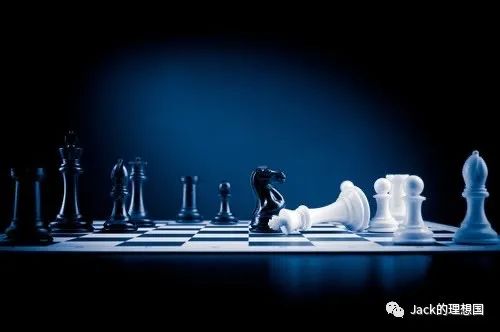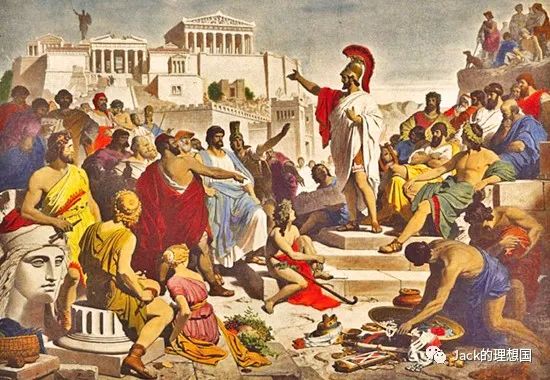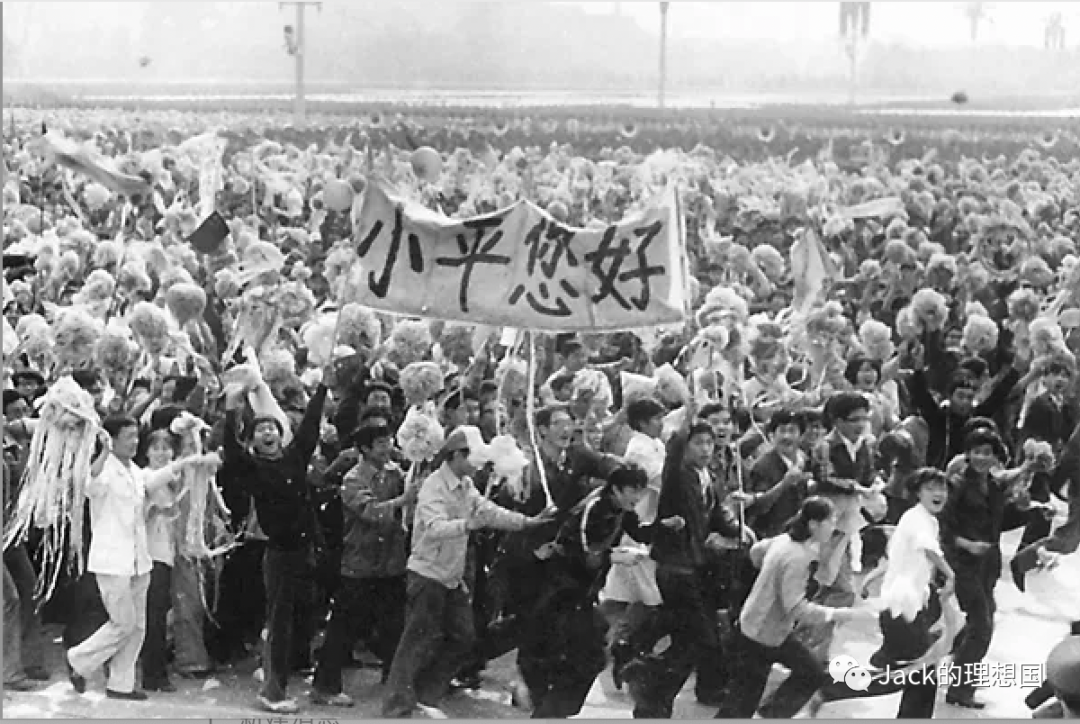Links Between East and West 20 My Heroes (Two) 东西方的连接20 - 我的英雄(二)

Politics and the government are two deciding factors behind civilization’s advancement. Throughout history, especially in the modern age, politicians have received a lot of criticism and even irony. But there have still been politicians that are worth revering. Personally, Pericles and Deng Xiaoping were two politicians who deserve reverence because they truly led to the creation and the flourishing of a new era in the ancient Greek and Chinese civilizations. They are two characters that pushed intrinsic progress in the sociopolitical aspect of humankind and are my heroes.
Pericles was a Greek politician who lived from around 495 BCE to 429 BCE. He was the political leader, or in the words of Thucydides, a contemporary historian during his time, “the first citizen of Athens.” The period during which he led Athens, roughly from 461 BCE to 429 BCE, is sometimes referred to as part of the “Golden Age of Athens” or as the “Age of Pericles.”

(Pericles giving his renowned "Funeral Oration")
I admire his firm and unwavering leadership style. According to Roman historian Plutarch, after assuming the leadership of Athens, “he was no longer the same man as before, nor alike submissive to the people and ready to yield and give in to the desires of the multitude as a steersman to the breezes.” During the Greco-Persian Wars, from 499 BCE to 449 BCE, Pericles was imperative in constructing and strengthening the Delian League, turning Athens into the Athenian Empire. He fortified relationships with other city-states and attempted to establish the Delian League as an economic powerhouse in the Greek world. Following the Greco-Persian Wars, Pericles firmly led Athens onto a path of cultural and political reconstruction and subsequent flourishing. In terms of Athenian culture, Pericles oversaw the construction of much of the Acropolis, including the Parthenon Temple, which partially acted as a cultural center. He additionally encouraged creations in the fields of art and philosophy. In terms of Athenian politics, Pericles pioneered the development of Athenian democracy and democratic values. Pericles enacted policies that constituted a “radical democracy”, meaning that the state paid most Athenian citizens to participate in public affairs. In his famous “Funeral Oration,” Pericles proudly claimed, “If we look to the laws, they afford equal justice to all in their private differences...if a man is able to serve the state, he is not hindered by the obscurity of his condition. The freedom we enjoy in our government extends also to our ordinary life. There, far from exercising a jealous surveillance over each other, we do not feel called upon to be angry with our neighbor for doing what he likes...”
This firm, committed, and arguably able leadership style made Pericles a charismatic and admirable leader. He subtly maintained the fragile balance between the people and the politicians of the Athenian democracy. Without him, Athenian politics and culture did not avoid chaos or decline. The first citizen of Athens succumbed to a plague that hit the city in 429 BCE, during the early stages of the Peloponnesian War. After his death, Athenian democracy became distorted, and the empire’s state took a sudden downturn. Factionalism plagued the city-state. The political fight between the younger Alcibiades and the more experienced Nicias was only one such event that dragged down the efficiency of the state (Wm). Later, the rise of the Thirty Tyrants only brought more harm to Athens. The disparities between the rich and poor widened with an inefficient, unorganized, and degenerating political system. The degeneration culminated in Athens’ loss of the Peloponnesian War to Sparta, and since the Athenian Empire did not recover.
China, a country with a feudal history of more than 2,000 years in the ancient East, also emerged in the 20th century with a visionary political leader: Deng Xiaoping. His "Reform and Open-up" policies still profoundly impact China today.

(On the 35th birthday of the PRC, students at Peking University spontaneously went on demonstration, holding signs that read "Hello Xiaoping")
In the late 1970s, with the end of the disastrous “Cultural Revolution”, Chinese society plunged into mass confusion. After Deng Xiaoping ascended to the core of the leadership, he had the foresight to propose the “Reform and Open-Up” strategy in 1978. Throughout his administration, Deng laid out a long-term strategic plan for China’s comprehensive modernization process, which has proven crucial to the country’s prosperity. Without his remarkable vision and overwhelming boldness, China would not have progressed as fast as it did, nor would it have the power and voice of a great power on the international stage as it does today.
Deng Xiaoping had rich political experience and fascinating wisdom to break a stranded situation. Faced with the critical national condition after the end of the Cultural Revolution, he recognized that he must first solve the problem on the ideological level. Without emancipating the mind first, he dared not think or do anything. He resisted the pressure and led his people to carry out a far-reaching movement to liberate the shackles of thought, which formed a tide of thought liberation in Chinese society, ridding it of the ideological dilemma that plagued China’s development after the Cultural Revolution.
Deng Xiaoping was adept at discovering the development patterns and grasping the problem’s crux. He respected objective facts and emphasized speaking from them. He paid more attention to investigation in the field. To put it in his own words, it is imperative to “walk around”, “see around”. He put forward many practical working dogmas, such as “allow the people to examine”, “be determined to try”, and more famously, “feel the stones beneath to cross the river”, “development is the hard truth”, etc. In a conservative China back then, he carried out a series of political experiments and economic development experiments with extraordinary political wisdom, promoting full-scale reform and opening-up in the country.
Deng Xiaoping had a methodical approach internally and a tactical approach externally. In the 1980s, he facilitated the gradual normalization of Sino-Soviet relations while also paying much attention to the core demands of the United States, finding the greatest common ground of interests between the two sides. “We must stay calm, and do a good job, our own job” in such strategically valuable relations, he claimed. In the Hong Kong issue, Deng creatively proposed the political concept of “one country, two systems”, which facilitated the peaceful return of the city. His diplomatic strategy wisely grasped and balanced the concerns of all parties, creating a favorable external environment for China’s reform and opening-up.
Twenty-five years after his death, the world is currently in a general state of regression, and China, admittedly, is facing many difficulties. At this moment, I believe China and the wider world can still procure a constant source of inspiration and forward momentum when reviewing his political thoughts and governing philosophy.
To be continued…
政治和政府是文明进步的两个重要因素。在人类历史发展的进程中,尤其是进入现代,许多政治家受到广泛批评,甚至讽刺,但仍有一些政治家值得推崇。就个人而言,伯里克利和邓小平是两位值得推崇的政治家,因为他们真正带了文明的兴起和时代的繁荣。他们是在人类社会政治方面推动进步的重要人物,他们是我的英雄。
伯里克利是一位希腊政治家,大约生活在公元前495年至公元前429年。他是政治领袖,或者用历史学家修昔底德的话说,"雅典的第一个公民"。他领导雅典的时期,大约从公元前461年到公元前429年,被称为 "雅典的黄金时代 "或 "伯里克利时代 " 。

(伯里克利发表著名的“国葬演说”)
他拥有坚定而果断的领导风格。根据罗马历史学家普鲁塔克的说法,在担任雅典的领导之后,"他不再是以前的那个人,也不像以前那样顺从于公众的欲望,不像一位水手屈服于风的吹拂。"在希腊-波斯战争(公元前499年到公元前449年)期间,伯里克利在构建稳固的提洛同盟和把雅典变为雅典帝国方面发挥了重要作用。他加强了与其他城邦的关系,并试图有效地将提洛同盟建成为希腊世界的经济霸主。在希腊-波斯战争之后,伯里克利坚定地带领雅典走上了文化和政治重建的道路,并在随后实现了繁荣。伯里克利监督了雅典卫城的大部分建设,包括部分作为文化中心的帕特农神庙。此外,他还积极鼓励艺术和哲学领域的创作。在雅典政治方面,伯里克利的表现尤其出色。他促进了雅典民主和民主价值观的发展。伯里克利颁布了 "激进民主 "的政策,这意味着大多数雅典公民都由国家支付报酬来参与公共事务。在他著名的 "国葬演说 "中,伯里克利自豪地声称:"我们的制度之所以被称为民主政治,因为政权是在全体公民手中,而不是在少数人手中。解决私人争执的时候,每个人在法律上都是平等的;让一个人负担公职优先于他人的时候,所考虑的不是某一个特殊阶级的成员,而是他们有的真正才能。任何人,只要他能够对国家有所贡献,绝对不会因为贫穷而在政治上湮没无闻。正因为我们的政治生活是自由而公开的,我们彼此间的日常生活也是这样的。当我们隔壁邻人做他们想做的事情时,我们不至于因此而生气;我们也不会因此而给他以难看的颜色,以伤他的情感,尽管这种颜色对他没有实际的损害。"
这种坚定、果断、干练的领导风格,使伯里克利成为一个富有魅力、令人钦佩的领袖。他以绝佳的政治手腕维持了雅典的民主和政治领袖之间的脆弱平衡。一个非常好的证明就是,雅典失去了他,政治和文化不可避免的陷入了混乱或衰落。公元前429年,在伯罗奔尼撒战争的早期阶段,这位雅典的第一公民死于一场瘟疫。他死后,雅典的民主发生畸变,帝国事业随之发生惊人逆转。帝国在失去这位能够统揽全局的灵魂人物之后,国势急转直下。城邦内部派系林立,年轻的亚西比德与老练的尼西阿斯之间的斗争,拖累了整个国家的效率。后来,"三十僭主 "的崛起给雅典政治带来更大的伤害。雅典的民主变成了一个低效、无组织、堕落的政治体系,贵族与贫民、富人与穷人的裂痕日深,最终在伯罗奔尼撒战争中败给了老对手斯巴达,自此雅典帝国一蹶不振。
在古老的东方,中国这个拥有着二千多年封建历史的国家在进入现代化社会的进程中也横空出世了一位拥有远见卓识的政治领袖,他就是邓小平。他所推动的 "改革开放 "的社会变革对于当代中国至今仍产生着深远的影响。

(国庆35周年,北京大学学生自发上街游行,高高举起“小平您好”的字样)
20世纪70年代末,随着灾难性的“文化大革命”的结束,中国社会陷入了一种群体性迷茫的状态。邓小平成为领导核心后,在1978年他非常有远见地提出了 "改革开放 "的策略。在他的整个执政生涯中,邓小平为中国的全面现代化进程制定了长期的战略计划,这已被证明对国家的繁荣至关重要。如果没有他卓越的远见和过人的胆识,中国就不会进步得那么快,也不会像今天这样在国际舞台上具有大国的实力和话语权。
邓小平拥有着丰富的政治经验和惊人的破局智慧,面对“文化大革命”结束后百废待兴的危局,他敏锐的认识到必须首先解决思想层面的问题,思想不解放,什么事都不敢想更不敢干。他顶住压力,带领他的人民开展了一场影响深远的解放思想桎梏的运动,进而在中国社会形成了一股思想解放的时代大潮,一举摆脱了文革后困扰中国向前发展的思想困境。
邓小平擅长发现事物发展的规律,抓住问题关键所在。他尊重客观事实,强调用事实说话。他更注重到实地进行调查,用他自己的话说就是到处“走一走”、“看一看”。他提出了许多切实可行的工作方法,比如“允许看”、“坚决地试”、“摸着石头过河”、“发展才是硬道理”等。在当时保守落后的中国,他以非凡的政治智慧进行了一系列政治实验和经济发展实验,推动了改革开放在中国的全面展开。
邓小平对内有方法,对外有谋略。置身于全球化浪潮,他从容应对国际变局,谨慎处理中美苏大三角的关系。80年代,他有节奏地推进中苏关系正常化,同时关注美国的核心诉求,找到双方最大的利益共同点。90年代初,东欧剧变、苏联解体,他沉着应对,强调“要冷静、冷静、再冷静,埋头实干,做好一件事,我们自己的事。”面对香港问题,他创造性地提出“一国两制”的政治构想,促进了香港的和平回归。正是在外交策略上他智慧的把握和平衡了各方的关切,才为中国改革开放营造了良好的外部环境。
邓小平是一代伟人,在他逝世的25年后,世界进入了罕见的倒退状态,中国也面临着重重困境,此时此刻,不只是中国,当全世界回顾他的政治思想和执政理念时,依旧能够获得源源不断的启迪和前进动力。
未完待续...
- 本文标签: 原创
- 本文链接: http://www.jack-utopia.cn//article/399
- 版权声明: 本文由Jack原创发布,转载请遵循《署名-非商业性使用-相同方式共享 4.0 国际 (CC BY-NC-SA 4.0)》许可协议授权










